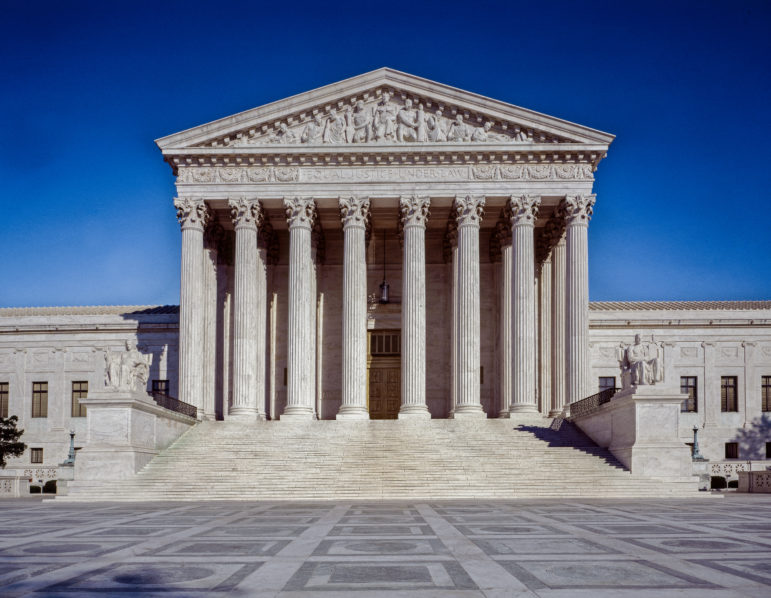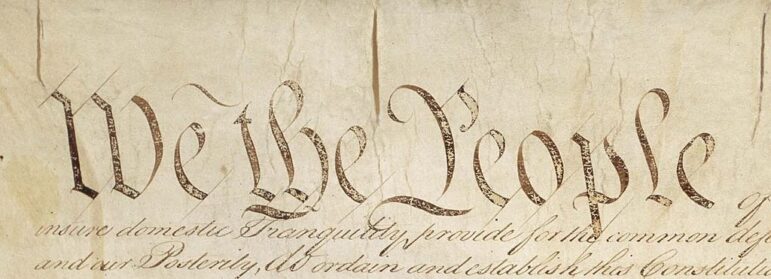WASHINGTON – The U.S. Supreme Court’s conservative majority appeared sympathetic this Wednesday morning to a Catholic Church-backed bid to establish the nation’s first religious charter school—St. Isidore of Seville Catholic Virtual School—in Oklahoma. The outcome of the case, Oklahoma Statewide Charter School Board v. Drummond, could significantly expand the use of taxpayer money for religious education.
The Court’s decision could erode seperation of church and state while simulatenously opening the door for schools presumably affiliated with any faith tradition, including Wiccan or other Pagan paths, to seek public funding through charter programs.
The justices heard over two hours of oral arguments addressing whether a religious organization has the constitutional right to participate in a state-funded charter school program and whether excluding such organizations violates the Free Exercise Clause of the First Amendment.

United States Supreme Court Building By Carol M. Highsmith – Library of CongressCatalog: http://lccn.loc.gov/2011631106Image download: https://cdn.loc.gov/master/pnp/highsm/12900/12912a.tifOriginal url: http://hdl.loc.gov/loc.pnp/highsm.12912, Public Domain, https://commons.wikimedia.org/w/index.php?curid=91285025
The Catholic Archdiocese of Oklahoma City and the Diocese of Tulsa jointly proposed St. Isidore, a fully online charter school with the stated mission of promoting Catholic teachings. Although the case focuses narrowly on this specific school, its implications are far-reaching.
At the heart of the case are two constitutional questions:
-
Do the academic and operational decisions of a privately-run school become “state action” simply because the institution contracts with the state to offer free education?
-
Can a state exclude religious entities from participating in a charter school program on Establishment Clause grounds, or does such exclusion violate the Free Exercise Clause?
Several conservative justices expressed concern that excluding religious schools from charter programs amounts to unconstitutional discrimination. Justice Brett Kavanaugh argued that barring religious organizations “is rank discrimination,” adding, “Our cases have made very clear… you can’t treat religious people, religious institutions, and religious speech as second-class in the United States.”
Justice Samuel Alito echoed this view and challenged Oklahoma Attorney General Gentner Drummond, who opposed the school’s approval. Alito referenced Drummond’s public warning that a ruling for St. Isidore could open the door to Islamic schools, suggesting such comments revealed “hostility toward particular religions.”
While the majority of the Court’s conservatives seemed supportive of the Catholic school’s arguments, Chief Justice John Roberts struck a more measured tone, questioning both sides. At one point, he referenced the Court’s 2021 ruling in Fulton v. Philadelphia, in which the justices sided with a Catholic agency that had been barred from the city’s foster care program due to its opposition to same-sex couples.
“How is that different from what we have here?” Roberts asked. “You have an education program, and you want to not allow them to participate with a religious entity.”
However, Roberts also distinguished Oklahoma’s case from earlier decisions that permitted public funds to support religious institutions. “This does strike me as a much more comprehensive involvement,” he said, noting that the state’s control over charter schools is more substantial than in voucher programs or tuition reimbursements previously upheld by the Court.

Preamble of the U.S. Constitution – We the People..
Oklahoma Attorney General Drummond argues that charter schools in the state are public schools and therefore subject to the same constitutional constraints, including prohibitions on religious instruction. In legal filings, he warned that permitting St. Isidore to operate would give religious charter schools “special status,” potentially exempting them from laws that conflict with their beliefs while remaining publicly funded.
The liberal justices expressed deep concern over how such a ruling could undermine the Establishment Clause. Justice Sonia Sotomayor warned that privileging the Free Exercise Clause in this way could effectively erase constitutional barriers to state-sponsored religion.
“What you are saying is the Free Exercise Clause trumps the essence of the Establishment Clause,” she said. “We’re not going to pay religious leaders to teach their religion.”
Justice Elena Kagan pointed to the practical consequences of allowing religious charter schools, suggesting that institutions with teachings steeped in particular doctrines, such as Orthodox Jewish schools or fundamentalist sects, could claim equal access to public funds. “Religious communities are really different in this country,” she noted. “And are often extremely different from secular communities.”
Kagan also raised the danger of selective inclusion. If religious charter schools become permissible, who decides which faiths qualify? “You’d get only accepted establishment religions,” she said, “while more fundamentalist groups would not.”
Although the conservative bloc has a 6–3 majority, the absence of Justice Amy Coney Barrett, who recused herself, likely due to her prior affiliation with Notre Dame Law School’s Religious Liberty Clinic, which represents St. Isidore, could lead to a 4–4 tie.
In that case, the Oklahoma Supreme Court ruling blocking the school would remain in effect, but the larger constitutional questions would remain unresolved.
If the Court rules for St. Isidore, it could prompt sweeping changes to charter school laws across the country. Currently, none of the 47 states that allow charter schools permit religious entities to operate them. A favorable decision could force many of those states to either change their laws or face legal challenges requiring them to accommodate religious schools.
The case is part of a broader trend in which the Court has prioritized religious liberty claims. In a trio of recent decisions—Trinity Lutheran v. Comer (2017), Espinoza v. Montana Department of Revenue (2020), and Carson v. Makin (2022)—the Court ruled that states cannot exclude religious entities from public benefit programs solely on the basis of their religious status.
The current push to authorize religious charter schools aligns with the goals of the conservative school choice movement, which promotes the use of public funds for private education, including religious schools. Supporters argue that families should have the freedom to choose faith-based education without forfeiting public support.
Critics, including public school advocates, warn that such shifts erode the foundation of secular public education and blur the line between church and state. The National Alliance for Public Charter Schools, while generally supportive of school choice, filed a brief urging caution. They warned that reclassifying charter schools as private could jeopardize public funding and compromise existing legal protections.
Justice Neil Gorsuch attempted to temper fears of a sweeping change, suggesting states could amend their charter laws to exert more direct control over schools, thereby ensuring secular instruction. Under such a framework, states could still impose curriculum requirements and restrict religious content.
Yet such adjustments may not satisfy all parties. For religious groups seeking full autonomy in religious instruction, more control by the state may defeat the purpose of joining the charter program in the first place.
Regardless of how the justices rule, the potential consequences of the decision are expansive. A win for the Catholic school in Oklahoma would not only reshape how states define and regulate public education—it would also extend constitutional protections to any faith-based school seeking public funding, whether it teaches Catholicism, Islam, Wicca, or other Pagan traditions.
That broad application has prompted concerns beyond the courtroom. As debates around pluralism, religious liberty, and education continue, the case of St. Isidore could set a precedent with major implications for religious minorities and public school systems alike.
The Wild Hunt is not responsible for links to external content.
To join a conversation on this post:
Visit our The Wild Hunt subreddit! Point your favorite browser to https://www.reddit.com/r/The_Wild_Hunt_News/, then click “JOIN”. Make sure to click the bell, too, to be notified of new articles posted to our subreddit.